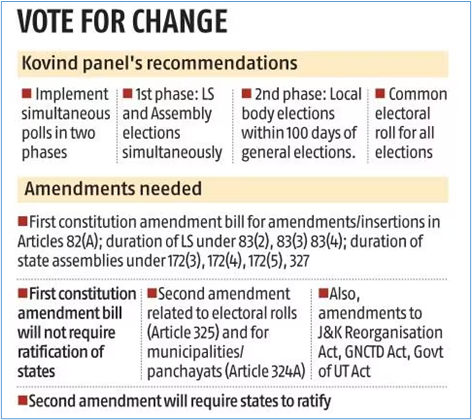PREVIOUS
Constitution amendment bills for ONOE
October 4 , 2024
51 days
244
0
- The government is likely to bring three bills, including two to amend the Constitution, to put in place its plan to hold simultaneous elections.
- The proposed Bill would seek to amend Article 82A by adding sub-clause (1) relating to the ‘appointed date’.
- It will also seek to insert sub-clause (2) to Article 82A relating to the end of terms of the Lok Sabha and state assemblies together.
- The Bill also proposes to amend Article 83(2) and insert new sub-clauses (3) and (4) relating to the duration and dissolution of the Lok Sabha.
- It also has provisions related to the dissolution of the legislative assemblies and amending Article 327 to insert the term ‘simultaneous elections’.
- The second Bill will create provisions to hold simultaneous elections to municipalities and panchayats, along with elections to Lok Sabha and state legislative assemblies by inserting a new Article 324A.
- This Bill is required ratification by at least 50% of the states.
- The third Bill will be an ordinary one to amend provisions in three laws dealing with Union Territories with legislative assemblies — Puducherry, Delhi and Jammu and Kashmir.
- It aims to align the terms of these Houses with other legislative assemblies and the Lok Sabha as proposed in the first Constitutional Amendment Bill.
- The statutes it proposes to amend are the Government of National Capital Territory of Delhi Act-1991, the Government of Union Territories Act-1963 and the Jammu and Kashmir Reorganisation Act-2019.
- To pass the Constitutional Amendment Bills, a special majority of not less than two-thirds of the House will be required.
- So, the government needs the support of 362 members, but it has only 292 members in the House.

Leave a Reply
Your Comment is awaiting moderation.


